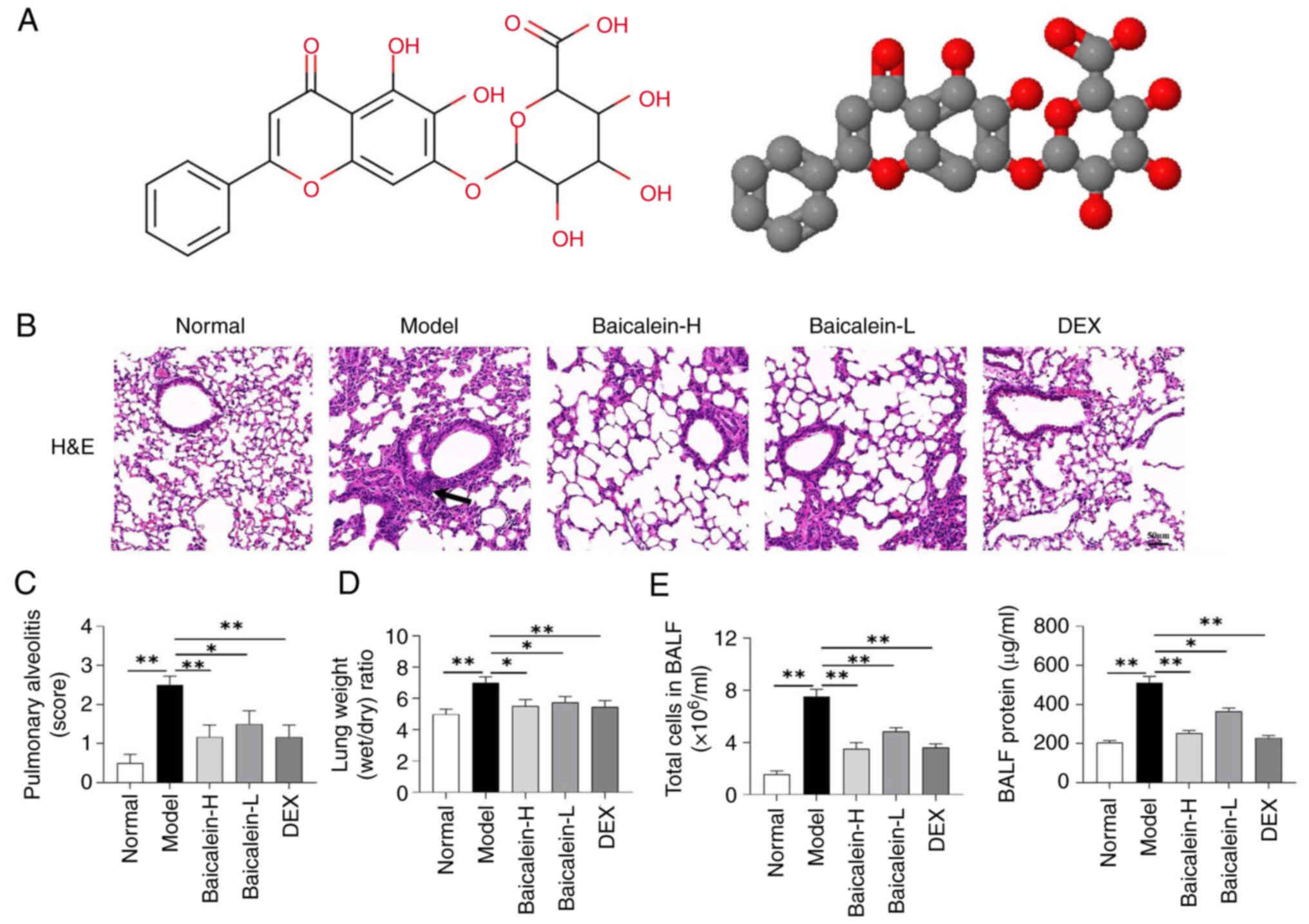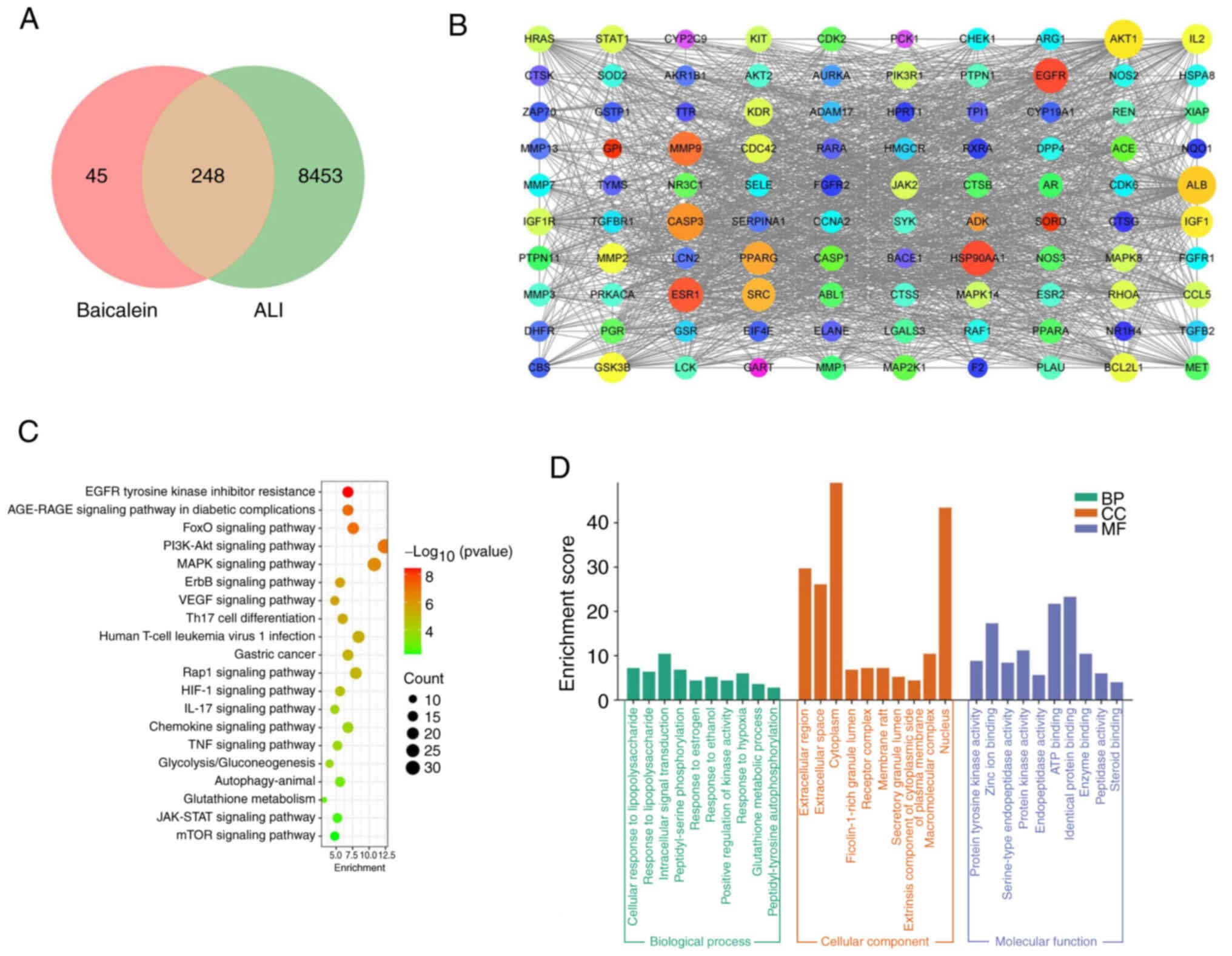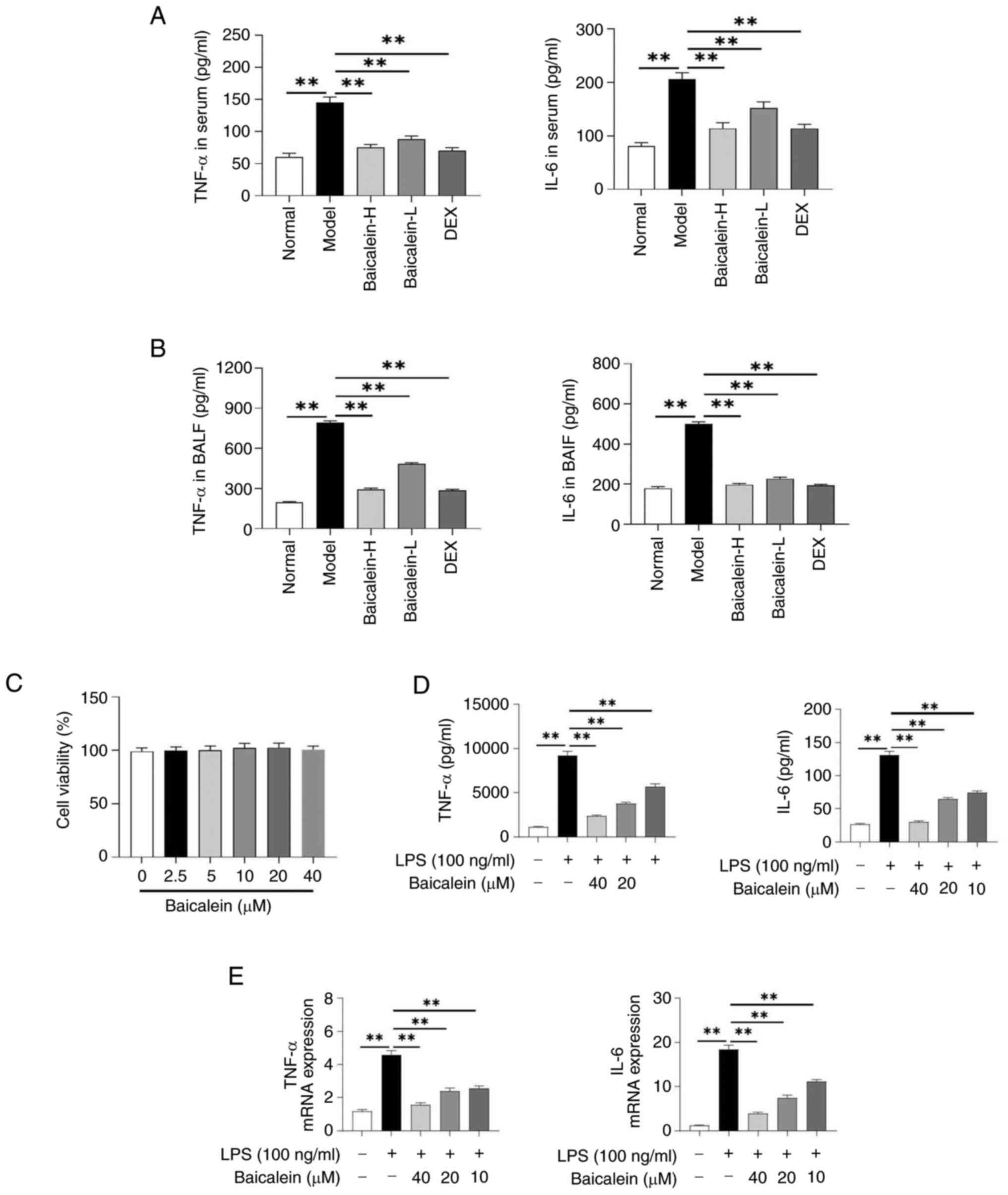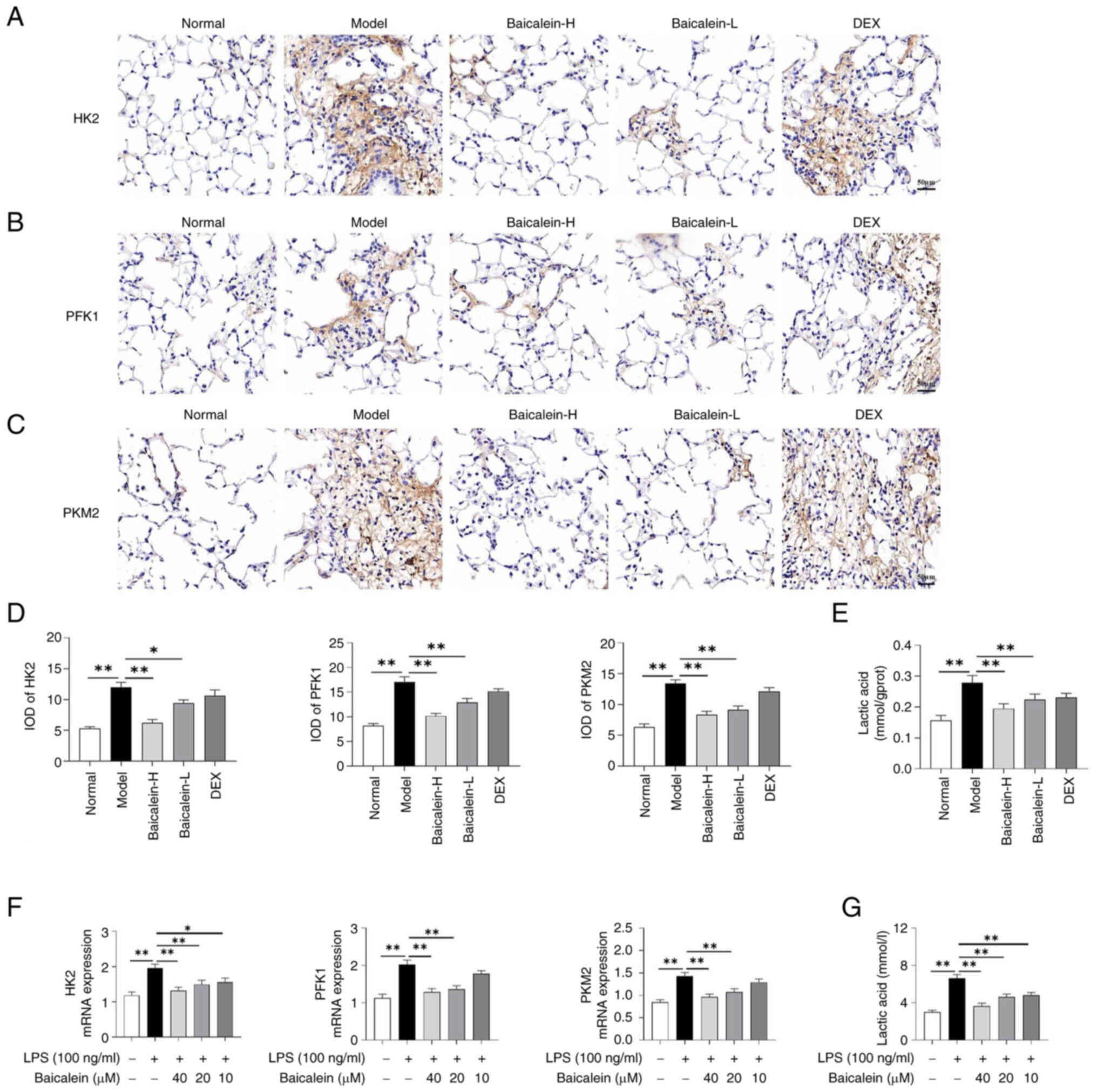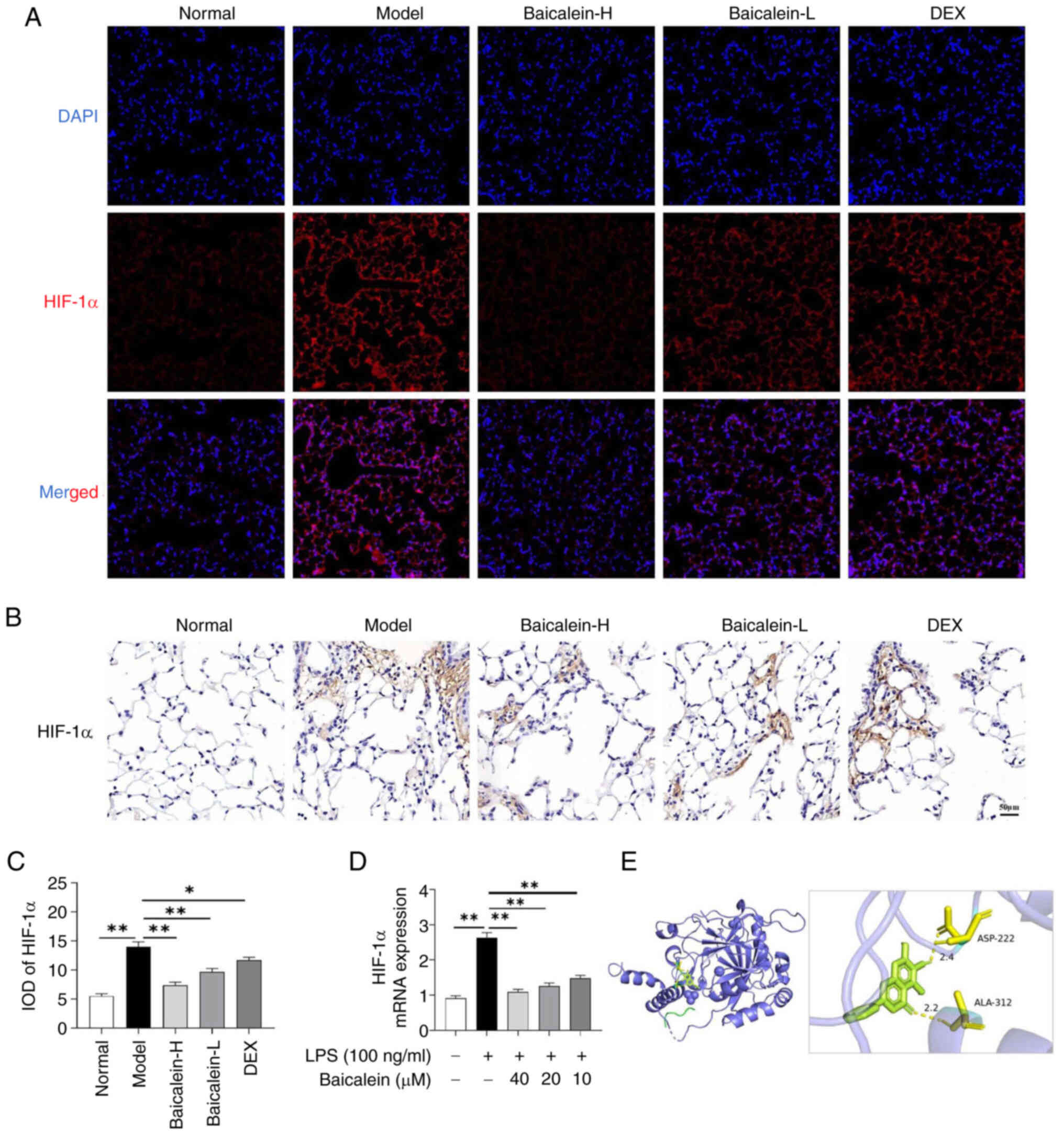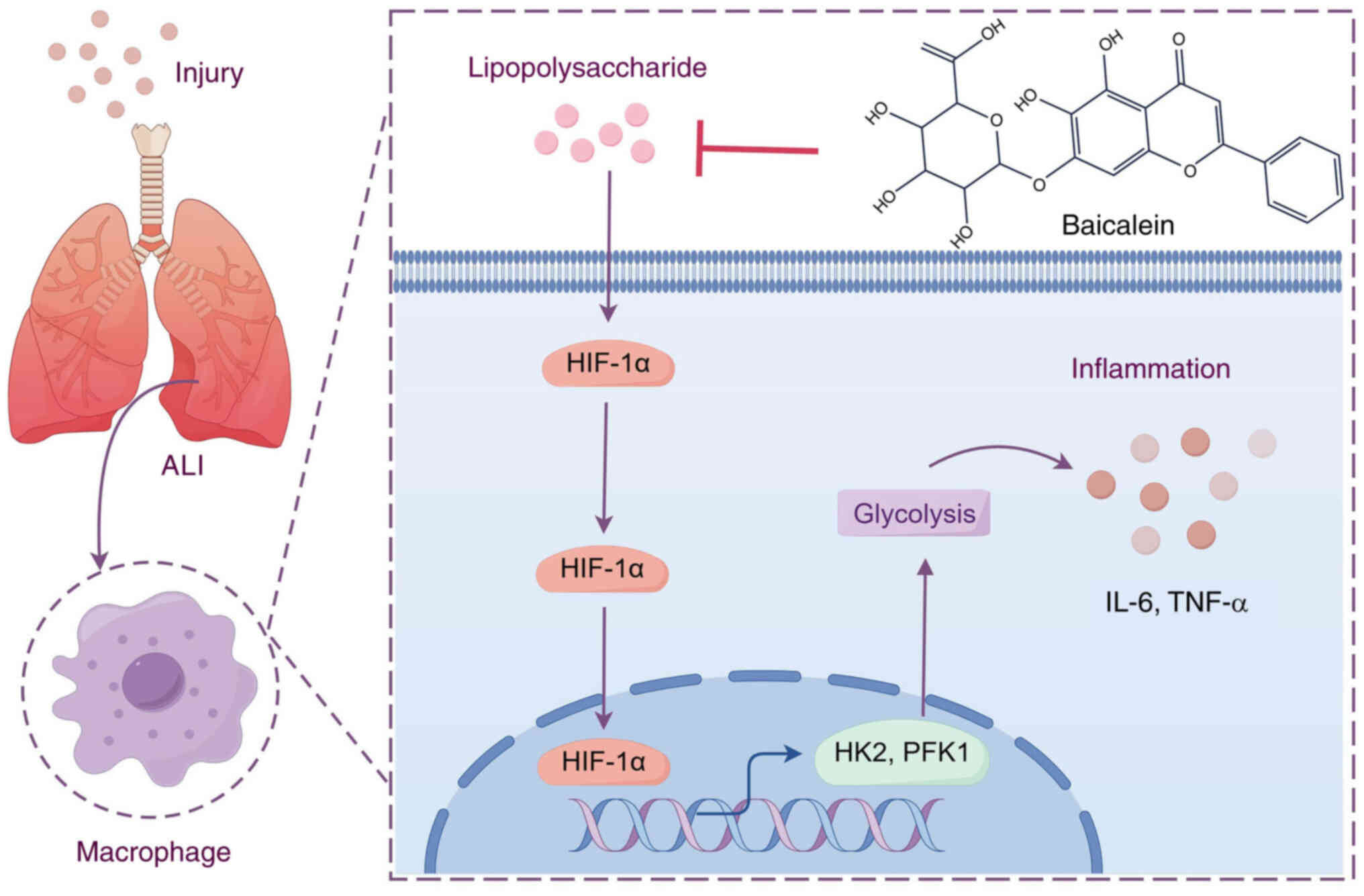|
1
|
Long ME, Mallampalli RK and Horowitz JC:
Pathogenesis of pneumonia and acute lung injury. Clin Sci (Lond).
136:747–769. 2022. View Article : Google Scholar : PubMed/NCBI
|
|
2
|
Johnson ER and Matthay MA: Acute lung
injury: Epidemiology, pathogenesis, and treatment. J Aerosol Med
Pulm Drug Deliv. 23:243–252. 2010. View Article : Google Scholar : PubMed/NCBI
|
|
3
|
Schmidt GA: Managing Acute Lung Injury.
Clin Chest Med. 37:647–658. 2016. View Article : Google Scholar : PubMed/NCBI
|
|
4
|
Fanelli V and Ranieri VM: Mechanisms and
clinical consequences of acute lung injury. Ann Am Thorac Soc. 12
(Suppl 1):S3–S8. 2015. View Article : Google Scholar : PubMed/NCBI
|
|
5
|
Huang X, Xiu H, Zhang S and Zhang G: The
Role of Macrophages in the Pathogenesis of ALI/ARDS. Mediators
Inflamm. 2018:12649132018. View Article : Google Scholar : PubMed/NCBI
|
|
6
|
Dzopalic T, Bozic-Nedeljkovic B and
Jurisic V: Function of innate lymphoid cells in the immune-related
disorders. Hum Cell. 32:231–239. 2019. View Article : Google Scholar : PubMed/NCBI
|
|
7
|
Sakaguchi M, Marutani E, Shin HS, Chen W,
Hanaoka K, Xian M and Ichinose F: Sodium thiosulfate attenuates
acute lung injury in mice. Anesthesiology. 121:1248–1257. 2014.
View Article : Google Scholar : PubMed/NCBI
|
|
8
|
Kosutova P, Kolomaznik M, Calkovska A,
Mokra D and Mikolka P: Nitric-Oxide-releasing dexamethasone
derivative NCX-1005 improves lung function and attenuates
inflammation in experimental lavage-induced ARDS. Pharmaceutics.
13:20922021. View Article : Google Scholar : PubMed/NCBI
|
|
9
|
Xia L, Zhang C, Lv N, Liang Z, Ma T, Cheng
H, Xia Y and Shi L: AdMSC-derived exosomes alleviate acute lung
injury via transferring mitochondrial component to improve
homeostasis of alveolar macrophages. Theranostics. 12:2928–2947.
2022. View Article : Google Scholar : PubMed/NCBI
|
|
10
|
Gopalakrishnan A, Joseph J, Shirey KA,
Keegan AD, Boukhvalova MS, Vogel SN and Blanco JCG: Protection
against influenza-induced Acute Lung Injury (ALI) by enhanced
induction of M2a macrophages: Possible role of PPARγ/RXR ligands in
IL-4-induced M2a macrophage differentiation. Front Immunol.
13:9683362022. View Article : Google Scholar : PubMed/NCBI
|
|
11
|
Wu S, Tang W, Liu L, Wei K, Tang Y, Ma J,
Li H and Ao Y: Obesity-induced downregulation of miR-192
exacerbates lipopolysaccharide-induced acute lung injury by
promoting macrophage activation. Cell Mol Biol Lett. 29:362024.
View Article : Google Scholar : PubMed/NCBI
|
|
12
|
Zhong WJ, Yang HH, Guan XX, Xiong JB, Sun
CC, Zhang CY, Luo XQ, Zhang YF, Zhang J, Duan JX, et al: Inhibition
of glycolysis alleviates lipopolysaccharide-induced acute lung
injury in a mouse model. J Cell Physiol. 234:4641–4654. 2019.
View Article : Google Scholar : PubMed/NCBI
|
|
13
|
Wang L, Cao Y, Gorshkov B, Zhou Y, Yang Q,
Xu J, Ma Q, Zhang X, Wang J, Mao X, et al: Ablation of endothelial
Pfkfb3 protects mice from acute lung injury in LPS-induced
endotoxemia. Pharmacol Res. 146:1042922019. View Article : Google Scholar : PubMed/NCBI
|
|
14
|
Jurisic V, Radenkovic S and Konjevic G:
The Actual Role of LDH as tumor marker, biochemical and clinical
aspects. Adv Exp Med Biol. 867:115–124. 2015. View Article : Google Scholar : PubMed/NCBI
|
|
15
|
Soto-Heredero G, Gómez de Las Heras MM,
Gabande-Rodriguez E, Oller J and Mittelbrunn M: Glycolysis-a key
player in the inflammatory response. FEBS J. 287:3350–3369. 2020.
View Article : Google Scholar : PubMed/NCBI
|
|
16
|
Jurisic V, Bumbasirevic V, Konjevic G,
Djuricic B and Spuzic I: TNF-alpha induces changes in LDH isotype
profile following triggering of apoptosis in PBL of non-Hodgkin's
lymphomas. Ann Hematol. 83:84–91. 2004. View Article : Google Scholar : PubMed/NCBI
|
|
17
|
Corcoran SE and O'Neill LA: HIF1α and
metabolic reprogramming in inflammation. J Clin Invest.
126:3699–3707. 2016. View
Article : Google Scholar : PubMed/NCBI
|
|
18
|
Dang B, Gao Q, Zhang L, Zhang J, Cai H,
Zhu Y, Zhong Q, Liu J, Niu Y, Mao K, et al: The glycolysis/HIF-1α
axis defines the inflammatory role of IL-4-primed macrophages. Cell
Rep. 42:1124712023. View Article : Google Scholar : PubMed/NCBI
|
|
19
|
Zhuang H, Lv Q, Zhong C, Cui Y, He L,
Zhang C and Yu J: Tiliroside ameliorates ulcerative colitis by
restoring the M1/M2 Macrophage Balance via the HIF-1α/glycolysis
Pathway. Front Immunol. 12:6494632021. View Article : Google Scholar : PubMed/NCBI
|
|
20
|
Sowndhararajan K, Deepa P, Kim M, Park SJ
and Kim S: Baicalein as a potent neuroprotective agent: A review.
Biomed. Pharmacother. 95:1021–1032. 2017. View Article : Google Scholar : PubMed/NCBI
|
|
21
|
Liu BY, Li L, Liu GL, Ding W, Chang WG, Xu
T, Ji XY, Zheng XX, Zhang J and Wang JX: Baicalein attenuates
cardiac hypertrophy in mice via suppressing oxidative stress and
activating autophagy in cardiomyocytes. Acta Pharmacol Sin.
42:701–714. 2021. View Article : Google Scholar : PubMed/NCBI
|
|
22
|
Ren M, Zhao Y, He Z, Lin J, Xu C, Liu F,
Hu R, Deng H and Wang Y: Baicalein inhibits inflammatory response
and promotes osteogenic activity in periodontal ligament cells
challenged with lipopolysaccharides. BMC Complement Med Ther.
21:432021. View Article : Google Scholar : PubMed/NCBI
|
|
23
|
Li B, Chen K, Qian N, Huang P, Hu F, Ding
T, Xu X, Zhou Q, Chen B, Deng L, et al: Baicalein alleviates
osteoarthritis by protecting subchondral bone, inhibiting
angiogenesis and synovial proliferation. J Cell Mol Med.
25:5283–5294. 2021. View Article : Google Scholar : PubMed/NCBI
|
|
24
|
Wang R, Wang C, Lu L, Yuan F and He F:
Baicalin and baicalein in modulating tumor microenvironment for
cancer treatment: A comprehensive review with future perspectives.
Pharmacol. Res. 199:1070322024.PubMed/NCBI
|
|
25
|
Ning B, Shen J, Liu F, Zhang H and Jiang
X: Baicalein Suppresses NLRP3 and AIM2 Inflammasome-Mediated
Pyroptosis in Macrophages Infected by Mycobacterium tuberculosis
via Induced Autophagy. Microbiol Spectr. 11:e4711222023. View Article : Google Scholar
|
|
26
|
Szapiel SV, Elson NA, Fulmer JD,
Hunninghake GW and Crystal RG: Bleomycin-induced interstitial
pulmonary disease in the nude, athymic mouse. Am Rev Respir.
120:893–899. 1979.PubMed/NCBI
|
|
27
|
Li Q, Peng J, Luo Y, Zhou J, Li T, Cao L,
Peng S, Zuo Z and Wang Z: Far infrared light irradiation enhances
Aβ clearance via increased exocytotic microglial ATP and
ameliorates cognitive deficit in Alzheimer's disease-like mice. J
Neuroinflammation. 19:1452022. View Article : Google Scholar : PubMed/NCBI
|
|
28
|
Jurisic V: Multiomic analysis of cytokines
in immuno-oncology. Expert Rev Proteomics. 17:663–674. 2020.
View Article : Google Scholar : PubMed/NCBI
|
|
29
|
Livak KJ and Schmittgen TD: Analysis of
relative gene expression data using real-time quantitative PCR and
the 2(−Delta Delta C(T)) Method. Methods. 25:402–408. 2001.
View Article : Google Scholar : PubMed/NCBI
|
|
30
|
Chin CH, Chen SH, Wu HH, Ho CW, Ko MT and
Lin CY: cytoHubba: Identifying hub objects and sub-networks from
complex interactome. BMC Syst Biol. 8 (Suppl 4):S112014. View Article : Google Scholar : PubMed/NCBI
|
|
31
|
Xie WM, Su W, Liu XY, Zhou J, Wang M, Wang
Y, Wang W, Bai X, Li Z and Li T: FTO Deficiency Alleviate
LPS-induced ALI by TXNIP/NLPR3-mediated alveolar epithelial cell
pyroptosis. Am J Respir Cell Mol Biol. 70:351–363. 2024. View Article : Google Scholar : PubMed/NCBI
|
|
32
|
Kligerman S: Pathogenesis, imaging, and
evolution of acute lung injury. Radiol Clin North Am. 60:925–939.
2022. View Article : Google Scholar : PubMed/NCBI
|
|
33
|
Rubenfeld GD and Herridge MS: Epidemiology
and outcomes of acute lung injury. Chest. 131:554–562. 2007.
View Article : Google Scholar : PubMed/NCBI
|
|
34
|
Hu Q, Hou S, Xiong B, Wen Y, Wang J, Zeng
J, Ma X and Wang F: Therapeutic effects of baicalin on diseases
related to gut-brain axis dysfunctions. Molecules. 28:65012023.
View Article : Google Scholar : PubMed/NCBI
|
|
35
|
Li J, Deng SH, Li J, Li L, Zhang F, Zou Y,
Wu DM and Xu Y: Obacunone alleviates ferroptosis during
lipopolysaccharide-induced acute lung injury by upregulating
Nrf2-dependent antioxidant responses. Cell Mol Biol Lett.
27:292022. View Article : Google Scholar : PubMed/NCBI
|
|
36
|
Li J, Lu K, Sun F, Tan S, Zhang X, Sheng
W, Hao W, Liu M, Lv W and Han W: Panaxydol attenuates ferroptosis
against LPS-induced acute lung injury in mice by Keap1-Nrf2/HO-1
pathway. J Transl Med. 19:962021. View Article : Google Scholar : PubMed/NCBI
|
|
37
|
Fukatsu M, Ohkawara H, Wang X, Alkebsi L,
Furukawa M, Mori H, Fukami M, Fukami SI, Sano T, Takahashi H, et
al: The suppressive effects of Mer inhibition on inflammatory
responses in the pathogenesis of LPS-induced ALI/ARDS. Sci Signal.
15:d25332022. View Article : Google Scholar : PubMed/NCBI
|
|
38
|
Luo L, Huang F, Zhong S, Ding R, Su J and
Li X: Astaxanthin attenuates ferroptosis via Keap1-Nrf2/HO-1
signaling pathways in LPS-induced acute lung injury. Life Sci.
311((Pt A)): 1210912022. View Article : Google Scholar : PubMed/NCBI
|
|
39
|
Zhang P, Zhang D, Zhou W, Wang L, Wang B,
Zhang T and Li S: Network pharmacology: Towards the artificial
intelligence-based precision traditional Chinese medicine. Brief
Bioinform. 25:bbad5182023. View Article : Google Scholar : PubMed/NCBI
|
|
40
|
Nogales C, Mamdouh ZM, List M, Kiel C,
Casas AI and Schmidt HHHW: Network pharmacology: Curing causal
mechanisms instead of treating symptoms. Trends Pharmacol Sci.
43:136–150. 2022. View Article : Google Scholar : PubMed/NCBI
|
|
41
|
Palomer X, Salvado L, Barroso E and
Vazquez-Carrera M: An overview of the crosstalk between
inflammatory processes and metabolic dysregulation during diabetic
cardiomyopathy. Int J Cardiol. 168:3160–3172. 2013. View Article : Google Scholar : PubMed/NCBI
|
|
42
|
O'Neill LA and Hardie DG: Metabolism of
inflammation limited by AMPK and pseudo-starvation. Nature.
493:346–355. 2013. View Article : Google Scholar : PubMed/NCBI
|
|
43
|
Jha MK, Song GJ, Lee MG, Jeoung NH, Go Y,
Harris RA, Park DH, Kook H, Lee IK and Suk K: Metabolic connection
of inflammatory pain: Pivotal role of a pyruvate dehydrogenase
kinase-pyruvate dehydrogenase-lactic acid axis. J Neurosci.
35:14353–14369. 2015. View Article : Google Scholar : PubMed/NCBI
|
|
44
|
Chen Z, Liu M, Li L and Chen L:
Involvement of the Warburg effect in non-tumor diseases processes.
J Cell Physiol. 233:2839–2849. 2018. View Article : Google Scholar : PubMed/NCBI
|
|
45
|
Gan P, Zhang S and Fred Wong WS: Targeting
reprogrammed metabolism as a therapeutic approach for respiratory
diseases. Biochem. Pharmacol. 228:1161872024.PubMed/NCBI
|
|
46
|
Chen J, Li G, Sun D, Li H and Chen L:
Research progress of hexokinase 2 in inflammatory-related diseases
and its inhibitors. Eur J Med Chem. 264:1159862024. View Article : Google Scholar : PubMed/NCBI
|
|
47
|
Webb BA, Dosey AM, Wittmann T, Kollman JM
and Barber DL: The glycolytic enzyme phosphofructokinase-1
assembles into filaments. J Cell Biol. 216:2305–2313. 2017.
View Article : Google Scholar : PubMed/NCBI
|
|
48
|
Israelsen WJ and Vander Heiden MG:
Pyruvate kinase: Function, regulation and role in cancer. Semin
Cell Dev Biol. 43:43–51. 2015. View Article : Google Scholar : PubMed/NCBI
|
|
49
|
Puleston DJ, Villa M and Pearce EL:
Ancillary Activity: Beyond core metabolism in immune cells. Cell
Metab. 26:131–141. 2017. View Article : Google Scholar : PubMed/NCBI
|
|
50
|
Wang C, Wang Y, Song D, Su J and Zhang F:
Therapeutic Effects of Modified Si-Miao-Yong-An Decoction in the
Treatment of Rat Myocardial Ischemia/Reperfusion Injury. Evid Based
Complement Alternat Med. 2022:14424052022.PubMed/NCBI
|
|
51
|
Gomez A, Serrano A, Salero E, Tovar A,
Amescua G, Galor A, Keane RW, de Rivero Vaccari JP and Sabater AL:
Tumor necrosis factor-alpha and interferon-gamma induce
inflammasome-mediated corneal endothelial cell death. Exp Eye Res.
207:1085742021. View Article : Google Scholar : PubMed/NCBI
|
|
52
|
Fang Y, Li Z, Yang L, Li W, Wang Y, Kong
Z, Miao J, Chen Y, Bian Y and Zeng L: Emerging roles of lactate in
acute and chronic inflammation. Cell Commun Signal. 22:2762024.
View Article : Google Scholar : PubMed/NCBI
|
|
53
|
Qiu B, Yuan P, Du X, Jin H, Du J and Huang
Y: Hypoxia inducible factor-1α is an important regulator of
macrophage biology. Heliyon. 9:e171672023. View Article : Google Scholar : PubMed/NCBI
|
|
54
|
Azzam HN, El-Derany MO, Wahdan SA, Faheim
RM, Helal GK and El-Demerdash E: The role of
mitochondrial/metabolic axis in development of tamoxifen resistance
in breast cancer. Hum Cell. 36:1877–1886. 2023. View Article : Google Scholar : PubMed/NCBI
|
|
55
|
Kierans SJ and Taylor CT: Regulation of
glycolysis by the hypoxia-inducible factor (HIF): Implications for
cellular physiology. J Physiol. 599:23–37. 2021. View Article : Google Scholar : PubMed/NCBI
|















